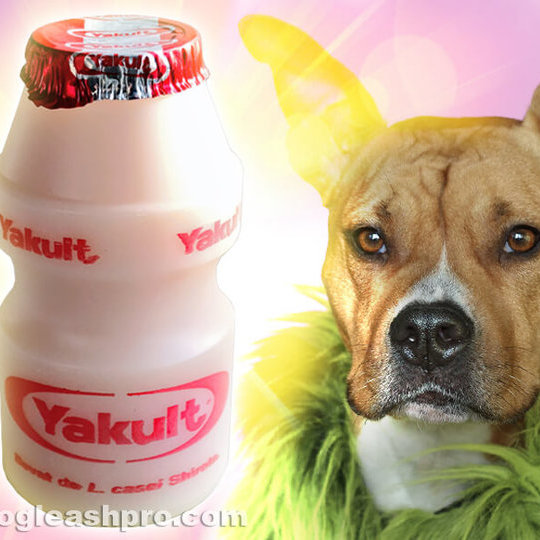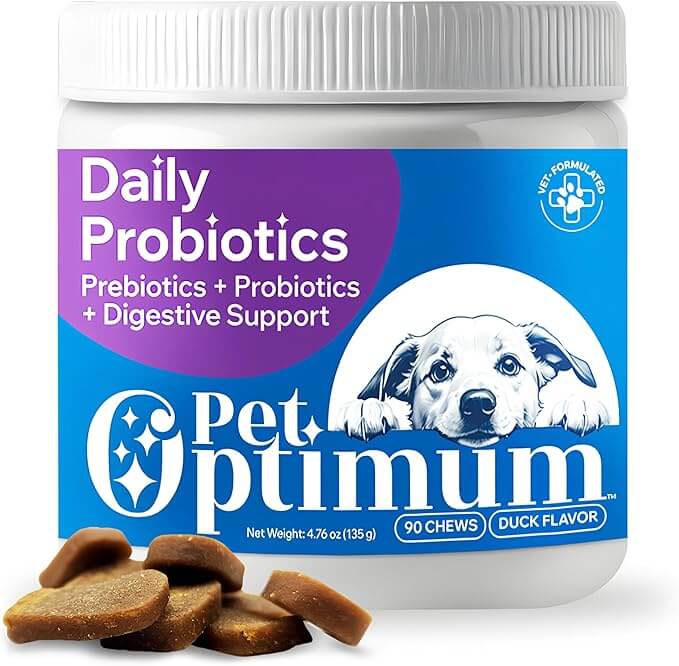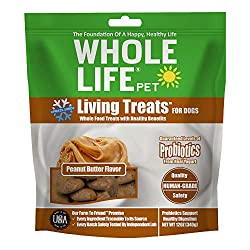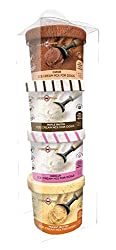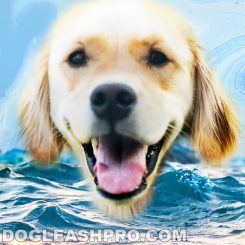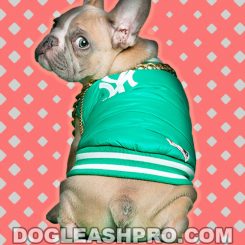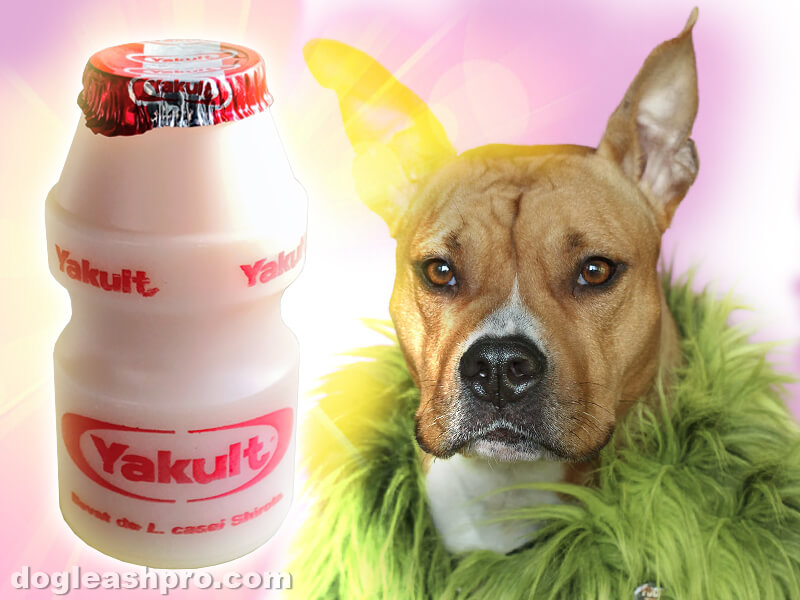
Can dogs drink Yakult? Yes, dogs can drink Yakult in moderation, if they are not lactose intolerant and if they can withstand the ingredients in Yakult. Although Yakult is packed full of good bacteria or probiotics, which can help promote proper functioning of the digestive system in dogs and improve their appetite, it is also packed full of sugar. Feeding Yakult to your dogs at least once a week can improve their gut health, but also keep in mind the high sugar level.
My favorite childhood drink was Yakult. Once in a while, I’ll buy a pack of Yakult from my local grocery store. The taste of Yakult brings back many fond memories of the good old days. Last Wednesday as I was drinking one, my Chihuahua ran over to me and begged for some. I was about to pour the Yakult into her water bowl but wondered if Yakult is safe for dogs to drink.
The key here is that dogs can drink Yakult if they are not lactose intolerant and can tolerate the ingredients found in this probiotic drink. Before you feed your pooch Yakult, make sure to check out the ingredients found in the middle of this article.
Table of Contents
Can dogs have Yakult?
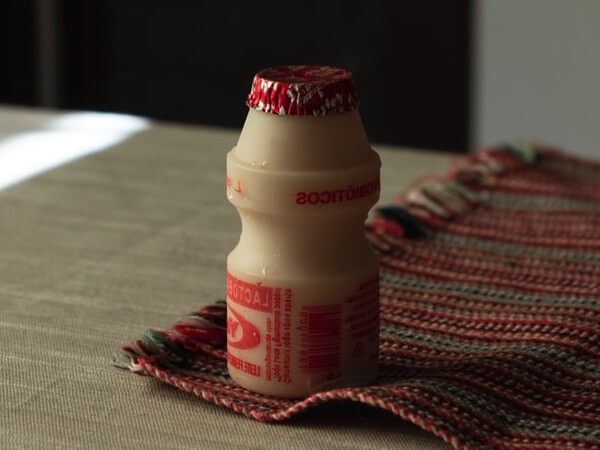
Yes, dogs can definitely have Yakult. We all want our furry friends to live happy, healthy, and active lives. In order for our canine friends to live long and healthy lives, they must have a healthy gut, which is when there is a balance of both good and bad bacteria.
It has been scientifically proven that there is a connection between gut health and mental health. Essentially, if one has a healthy gut, then he or she will have a healthy mind. The same can be said for our canine companions.
Did you know that the gut or gastrointestinal tract accounts for the largest immune organ in your dog’s body? The gastrointestinal tract also contains at least 70% of all immune cells! When your dogs’ digestive system is healthy and strong, they are less likely to get sick or feel lethargic. Instead, your pups will be happy, healthy, and full of energy.
One of the ways that dogs can have and maintain a healthy gut is by having the right amount of good bacteria or probiotics in their digestive system. An imbalance of bad and good bacteria in the gut leads to an unhealthy gut.
An unhealthy gut could also be due to the fact that there are more bad bacteria in the gastrointestinal tract (gut) than good bacteria.
If your pooch is experiencing the following symptoms, then he or she may have poor gut health:
- Gastrointestinal issues such as diarrhea, chronic nausea, and leaky gut.
- Inflammation.
- Vomiting.
- Skin infections especially in your canine’s ears, such as itchiness and yeast infections.
- Shedding and dull hair due to scratching or biting their skin excessively.
- Frequently licking their paws.
Fortunately, there is an easy way to solve this health issue and that is to give your pooch probiotics, which should provide a balance of both good and bad bacteria in the dog’s digestive system.
For dog owners looking for a specially formulated probiotic solution for their canine companions, PetOptimum Probiotics for Dogs offers a safe and effective option. Designed specifically for dogs, it provides the essential good bacteria needed for optimal gut health without the concerns associated with human products like Yakult.
The probiotic Yakult drink, which is fermented with Lactobacillus, a good bacteria strain.
Let’s quickly explore what the Yakult drink is, what is it good for and what it is made of.
What is Yakult drink?
The Yakult drink is a tasty probiotic milk beverage that is sweet. Yakult is a Japanese drink since it originated in Tokyo, Japan. This cute tiny-sized probiotic drink is fermented and contains billions of active and live bacteria called Lactobacillus paracasei Shirota, which is considered good bacteria.
What is Yakult good for?
The Yakult drink is great for the digestive system. The billions of friendly live microorganisms in this probiotic drink can correct any imbalances in the digestive system.
What is Yakult made of?
The fermented Yakult drink is made with the following six ingredients:
- Water.
- Sugar.
- Nonfat milk.
- Glucose syrup.
- Natural flavors.
- Live Lactobacillus casei Shirota bacteria.
Let’s discuss whether these ingredients are safe for dogs and how they can benefit your dog’s digestive system. It’s important to note that some of the ingredients in the Yakult drink may not sit well in your dog’s stomach.
Since all dogs are different and have different tolerance to different types of food and drink, be sure to only feed your pups a little bit of the Yakult drink if they have never had it before and see if they react to the drink.
Yakult ingredients: are they safe for dogs?

We will discuss which ingredient in Yakult is safe for dogs and which may not be healthy for dogs. stomach.
Nonfat milk is harmful to dogs that are lactose intolerant
Although nonfat milk has lower fat and cream content compared to whole milk, it is still a dairy product. If your furry family members are lactose intolerant, it is a good idea not to feed them Yakult.
Dogs that are lactose intolerant cannot break down the natural sugar that’s found in milk called lactose because they don’t have the lactase enzyme.
If you’ve never fed your canine friends dairy products before, you can give them a little bit of the Yakult drink and see how they react. Dogs that are lactose intolerant will typically pass a lot of gas or have loose stool after eating dairy products.
If this is the case with your furry friends, it’s best to avoid feeding them dairy drinks and instead go with healthy non-dairy drink alternatives for your pups.
Sugar and glucose syrup are not healthy for dogs
While sugar in Yakult is used to keep the probiotics alive during its shelf life, it has no place in your dog’s daily diet. Sugary food does not provide any nutritional value to your pooch and only increases the calorie intake in your dog’s diet.
When dogs eat too much sugar, it can lead to poor dental health, diabetes, canine obesity, and even pancreatitis in severe cases.
Because of this, you should avoid giving Yakult to your canine friends if they are diabetic or trying to maintain a healthy weight. If your pups are healthy, then you can give them a certain amount of the Yakult drink. We will discuss below how much Yakult to feed your pooch, which is dependent on his or her size.
While glucose syrup is not toxic to dogs, it does have very high sugar content. Again, drinks that are high in sugar are very bad for dogs. Any responsible dog owner should keep sugar away from their pooch.
Live Lactobacillus casei Shirota bacteria is great for dog’s gut health
Lactobacillus casei is a type of probiotic that is already found in a dog’s intestines. In fact, our canine friends have the following types of friendly and good bacteria in their gastrointestinal tract:
- Lactobacillus casei.
- Lactobacillus acidophilus.
- Bifidobacterium lactis.
- Enterococcus faecium.
- Bifidobacterium breve.
This means that feeding your pooch Yakult will help to maintain a healthy amount of good bacteria in your dog’s gut or improve the balance of good and bad bacteria in their guts. Keep in mind that probiotics are good for dogs because they are friendly or good bacteria.
These good bacteria help provide dogs with a strong immune system so they can fight infections and help promote proper digestive system functions. Lactobacillus casei bacteria also supply dogs with a healthy microbiome because this type of good bacteria also makes nutrients and vitamins.
Here’s are other ways Lactobacillus casei can help your dog:
- Increase your dog’s energy levels so they are more active.
- Healthy stools.
- Stronger and healthier bones.
- Boost your dog’s immune system.
- Promote a healthier coat that is soft and full.
Dogs with poor gut health will benefit from having a little bit of Yakult. However, make sure that your pooch can tolerate dairy products and does not have existing health issues like diabetes or obesity.
Lactobacillus vs Bifidobacterium
You’ve probably noticed these two words used frequently in the list of friendly and good bacteria in a dog’s gastrointestinal tract.
That is because the good and healthy live bacteria or probiotics are broken down into two main groups: lactobacillus and bifidobacterium.
Here is the difference between the two:
- Bifidobacterium: You can find bifidobacterium in dairy foods such as milk, ice cream, cheese, and butter.
- Lactobacillus: Lactobacillus is usually found in fermented drinks like Yakult, cider, and cultured milk. It is also in yogurt.
How many Yakult for dogs?
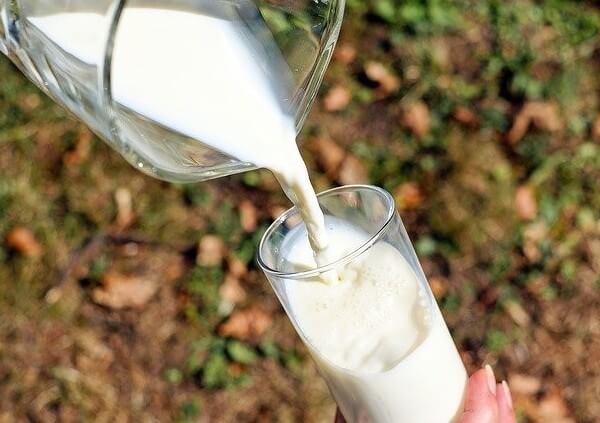
To find out how many or how much Yakult to feed your dogs, let’s take a look into the nutritional value of a Yakult bottle.
Yakult bottle size for dogs?
In the United States, one bottle of Yakult usually comes in the size of 2.7 fluid ounce (fl oz) which is 80 mL. Each 2.7 fl oz Yakult drink contains the following:
Nutritional value of Yakult (Per bottle 2.7 fl oz)
| Name, Unit | Amount |
| Calories, cal | 50 |
| Sodium, mg | 15 |
| Total Carbohydrate, g | 12 |
| Sugar, g | 10 |
| Protein, g | 1 |
| Calcium, mg | 40 |
| Potassium, mg | 50 |
As you can see, there are 10 grams of sugar in a 2.7 fl oz bottle of Yakult. This is equivalent to one slice of bread or one piece of fruit. While it is not much for humans, this much sugar is harmful to our four-legged friends.
What’s also surprising that wasn’t included in the ingredients is the high sodium content in Yakult. 15mg of sodium is a lot and this is why you should avoid giving your pooch the whole bottle of Yakult.
This is why for a 2.7 fl oz bottle of Yakult, it’s best to serve your canine friends the following Yakult dosage depending on their health, size, and tolerance to dairy products.
2.7 fluid ounce (fl oz) or 80 mL Yakult bottle
- Small dog breeds: Less than a quarter of the bottle.
- Medium dog breeds: A quarter of the bottle.
- Large dog breeds: Half of the bottle.
Can I give human probiotics to dogs?
Yes, you can give human probiotics to dogs since the probiotics are not toxic to dogs. However, it’s important to note that human probiotics may not provide the same degree of benefits to dogs.
Human probiotics for dogs with diarrhea
If your canine friends are having diarrhea or the following symptoms, it’s best to ask your veterinarian if they can safely have human probiotics that are found in Yakult.
- Passing gas frequently.
- Abdominal pain or discomfort.
- Cramps.
- Loss of appetite or poor appetite.
- Bad breath.
Note that Yakult is a fermented sweet drink that is made for human consumption so if you’re thinking about giving your pups some Yakult, it’s best to ask your vet first.
You should definitely consult with your vet before giving your furry family members any probiotics or supplements, especially if you know that they have food allergies. Your vet may also provide a list of dog-friendly probiotics or supplements.
This is the one we give to our furbabies:
When shouldn’t you feed Yakult to your dog?
If your canine companion has pre-existing health issues like obesity, diabetes, kidney failure, liver disease, or pancreatitis, it’s best to avoid giving them Yakult. Yakult has a high sugar content, which can make these existing health problems worse.
Additionally, do not feed your furry friends Yakult if they are lactose intolerant.
Substitute for Yakult that is dog-friendly and non-toxic
If your furry family member is experiencing poor gut health or is having diarrhea, there are plenty of food options available such as that can be given to dogs in moderation:
Sauerkraut is also fermented so it is loaded with probiotics. The probiotics found in Sauerkraut can also help with the following: support good bacteria growth, promote healthy gut or gastrointestinal tract, absorb fats, and support good cardiac health in dogs.
Before giving your canine friends sauerkraut, be sure it is free from added flavors like salt and seeds.
Yogurt is packed full of protein and calcium. It is also fermented so it contains probiotics, which are great for dogs. It’s best to give your pooch plain yogurt that is naturally flavored and low-fat.
Kombucha is another fermented drink that can help improve the dog’s digestive system. Since dogs don’t like fizzy drinks, it’s best to pour it into their raw blend during meal prep.
If I’m ever out of these above options, I feed my pooch this dog treat that contains natural greek yogurt which contains live active cultures:
If your dogs love the creamy taste, here is a dog-friendly ice cream mix:
So, can dogs drink Yakult?
If your canine friends are healthy and are not lactose intolerant, then they can have a little bit of Yakult. The amount of Yakult dogs can have really depends on the dog’s size and health as stated above.
While you can feed your pooch Yakult, it’s important to note that not all food or drinks that contain probiotics are good or safe for dogs. Before you feed your pups any drink or food that’s made for human consumption, speak with your vet first.
If your canine friends have digestive health issues, ask your vet for the best probiotics for dogs.
Related Questions
Dogs can generally drink Yakult once a week if they are not lactose intolerant and do not have diabetes or weight management problems. Depending on the size of your dog, you can give them a certain amount of Yakult.
Before feeding your pooch Yakult, make sure to confirm with your vet first. Your vet should also let you know the right amount of Yakult to feed your pooch and how often.
You can give your dog natural probiotics that are found in kefir or yogurt. These dairy products contain live cultures that are good for dogs. However, please note that not all yogurt or kefir has probiotics.
It’s best to feed your pooch dog food that contains probiotics.
Yakult is harmful to dogs that are lactose intolerant, have an existing case of diabetes, pancreatitis, liver disease, kidney failure, or obesity. If your canine friends have any of these health conditions, it’s best to avoid feeding them Yakult.
Yes, you can give your dog regular probiotics, but it’s best to give your pup dog-specific probiotics.
If your dogs are vomiting, you should find out why they are vomiting. Dogs vomit for different reasons, other than just having an upset stomach. Before you feed your dog Yakult, call your vet first. Your vet may prescribe other medications or probiotics that are best for dogs.
Yakult is a drink that is marketed to humans. The Yakult website states that humans should have Yakult every day. However, when it comes to our canine friends, feeding them Yakult every day is not necessary.
Instead, it’s best to consult with your vet and ask for dog-friendly probiotics that can help with your dog’s gut health.
Yes, Yakult can be a good option for dogs with diarrhea. Usually, if dogs have diarrhea, it’s a reflection of their gut health. There may be more bad bacteria in the gastrointestinal tract than good bacteria.
The probiotics found in Yakult can help increase the good bacteria in the dog’s gut so that there’s a balance of good and bad bacteria.
We recommend that you speak with your vet first and ask for their advice before giving Yakult to your dogs.
Before you give your dogs Yakult for their upset stomach, find out the cause of the upset stomach. Perhaps, your four-legged friends ate something they were not supposed to. If you’re not sure, call your vet first to treat the upset stomach problem. Don’t just feed your dogs Yakult to solve this issue.
DISCLAIMER: THIS WEBSITE DOES NOT PROVIDE MEDICAL ADVICE
The information, including but not limited to, text, graphics, images and other material contained on this website are for informational purposes only. No material on this site is intended to be a substitute for professional veterinary advice, diagnosis, or treatment. Always seek the advice of your veterinarian or other qualified health care provider with any questions you may have regarding dietary needs.
YAKULT is a registered trademark of KABUSHIKI KAISHA YAKULT HONSHA. Dogleashpro does not claim any ownership of the YAKULT name, logo, or any identifying mark in any way. This article is for educational purposes only.
Resources:
https://en.wikipedia.org/wiki/Yakult
https://en.wikipedia.org/wiki/Probiotic

With over five years of specialized experience as an animal writer, my expertise lies in dog nutrition, health, behavior, grooming, and training. I am dedicated to delivering helpful and informative content that caters to the well-being of our furry friends. My primary goal is to empower pet owners with knowledge and ensure our canine companions thrive in health and happiness. In my free time, I love volunteering at local dog rescue centers.
